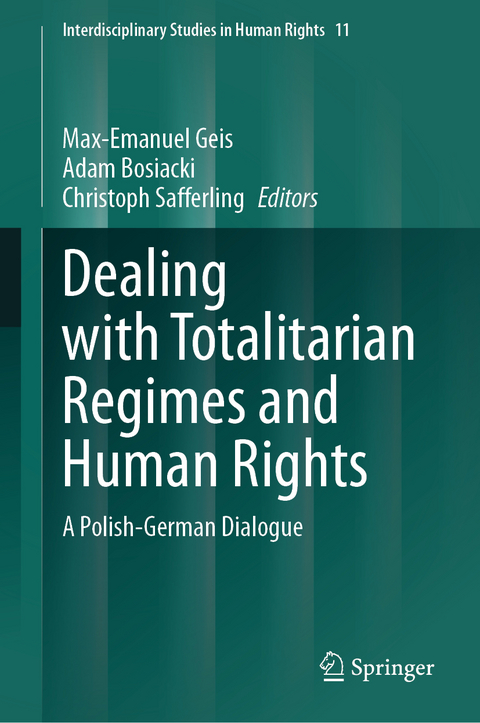
Dealing with Totalitarian Regimes and Human Rights
Springer International Publishing (Verlag)
978-3-031-57337-8 (ISBN)
Dr. Max-Emanuel Geis is professor of German and Bavarian public and administrative law at the Friedrich-Alexander-University Erlangen-Nuremberg. Furthermore he is a Justice at the Bavarian Constitutional Court. He is also a member of the evaluation committee of the German Council of Science.
Dr. Adam Bosiacki is professor of public law and legal history at the University of Warsaw. He is the Director of the institute of sciences on state and law and head of the department of the history of political and legal thought. He has been a visiting scholar in a number of academic units, including Max-Planck-Institute in Frankfurt, Harvard University and the Hoover Institute at Stanford University. He is also teaching at the Jagiellonian University in Krakow.
Dr. Christoph Safferling, LL.M. (LSE) is professor of criminal law, criminal procedure and international law at the Friedrich-Alexander-University ErlangenNuremberg and the director of the International Criminal Law Research Unit. He is Director of the International Nuremberg Principles Academy and the Whitney R. Harris Fellow of the Robert H. Jackson Center in Jamestown, New York, USA.
Part I - Treaties and Trials: Historical Backdrop.- The Nuremberg Trial against the Major German War Criminal before the International Military Tribunal (1945-1946).- Failed justice and the victims of the Eastern Front of the First World War: Criminal justice - vigilante justice - political justice.- The Nuremberg Principles from Historical, Philosophical and Contemporary Legal Perspectives.- Criminal Defence at the Nuremberg Trial of the Major War Criminals: Strategies and Impact.- Part II - Observing and Restructuring: Institutional Emancipation.- The Long Shadows of the Past: The Federal Ministry of Justice and the Nazi Era.- Protecting the Democratic State Through Criminal Law - Legislation History and the Role of the Federal Public Prosecutor.- The Combat of Communist Ideology and Propaganda in the Legal Order of the Second Republic of Poland, 1918-1939.- Towards totalitarian regime: Legal and organisational aspects of transformation of defence and security forces.- Part III - Becoming Second Nature: Constitutional Lessons.- The Weimarian Methodological Debate In The Doctrine Of Constitutional Law.- The Development of the "Fortified Democracy" Concept.- Dealing with the National Socialist Past in Germany.- Reconciliation, transformation, historical policy. Legal aspects of settlements with totalitarian systems towards Poland since 1989.- Polish Property Transformations in the Context of Transitional Justice (since 1988).- The Legal Status of the Institute of National Remembrance - Commission for the Prosecution of Crimes Against the Polish Nation.
| Erscheinungsdatum | 02.07.2024 |
|---|---|
| Reihe/Serie | Interdisciplinary Studies in Human Rights |
| Zusatzinfo | XII, 257 p. |
| Verlagsort | Cham |
| Sprache | englisch |
| Maße | 155 x 235 mm |
| Themenwelt | Geschichte ► Allgemeine Geschichte ► 1918 bis 1945 |
| Recht / Steuern ► EU / Internationales Recht | |
| Sozialwissenschaften ► Politik / Verwaltung | |
| Schlagworte | historical reappraisal • Policy of Dealing with the Past • Polish-German Dialogue • Totalitarianism in Poland and Germany • Transitional Justice |
| ISBN-10 | 3-031-57337-4 / 3031573374 |
| ISBN-13 | 978-3-031-57337-8 / 9783031573378 |
| Zustand | Neuware |
| Informationen gemäß Produktsicherheitsverordnung (GPSR) | |
| Haben Sie eine Frage zum Produkt? |
aus dem Bereich


